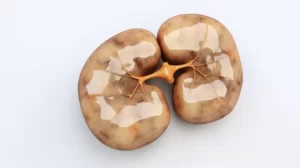Statins are commonly prescribed to help lower cholesterol levels and reduce the risk of heart disease. While these medications are helpful for many patients, it’s essential to be aware of the potential risks and side effects. One such risk is kidney damage, particularly acute kidney injury (AKI) associated with high doses of statins (such as rosuvastatin, atorvastatin, and simvastatin). With over 30 million Americans taking statins, being informed about the risks and potential complications is crucial.
Understanding Acute Kidney Injury (AKI)
Acute kidney injury is a serious condition that can lead to irreversible kidney damage, requiring patients to undergo dialysis or even a kidney transplant. AKI is characterized by a rapid decline in kidney function, often within hours or days. Common symptoms include reduced urine output, fluid retention, and shortness of breath. If not addressed promptly, AKI can be life-threatening.
A recent study by Canadian researchers found that individuals taking relatively high doses of statins were 34 percent more likely to develop AKI. Considering that around 40,000 people die from AKI in the United States every year, this is an alarming statistic. Furthermore, deaths resulting from AKI have more than doubled over the past decade in the US.
How Statins Affect Kidney Function
Statins work by inhibiting an enzyme called HMG-CoA reductase, which is involved in the production of cholesterol in the liver. While this effect is beneficial for lowering cholesterol levels, it can also have adverse effects on kidney function.
High doses of statins can cause inflammation and oxidative stress in the kidneys, which may contribute to kidney damage. Moreover, theories suggest that the decreased production of cholesterol in the liver caused by statins can negatively impact the kidney’s ability to filter toxins and waste products from the blood.
Reducing the Risk of Kidney Damage from Statins
It’s essential to follow your healthcare provider’s recommendations when taking statins and to be vigilant about potential side effects. Here are some steps you can take to help minimize your risk of kidney damage while on statin therapy:
- Monitor your kidney function: Regular check-ups and blood tests to assess kidney function are vital when taking statins. Early detection of kidney problems can help to prevent further damage and potentially avoid AKI.
-
Stay hydrated: Dehydration can contribute to kidney damage, so it’s essential to drink plenty of water while on statins. Aim for at least eight cups of water per day, and avoid excessive caffeine and alcohol intake, which can be dehydrating.
-
Follow a kidney-friendly diet: Consuming a diet rich in fruits, vegetables, whole grains, and lean proteins can help to support kidney health. Also, avoid high-sodium foods and limit your intake of foods high in potassium and phosphorus if your kidneys are already damaged.
-
Exercise regularly: Physical activity can help to maintain healthy blood pressure and blood sugar levels, which support healthy kidney function.
-
Report any side effects to your healthcare provider: If you experience any symptoms of AKI or other side effects while taking statins, it’s essential to inform your healthcare provider right away. They may need to adjust your medication or dosage to minimize potential risks.
Alternatives to Statins
If you’re concerned about the potential kidney-related risks of taking statins or have experienced side effects in the past, it’s worth discussing alternative treatment options with your healthcare provider. These may include:
- Lifestyle modifications: Making changes to your diet, exercise, and stress management habits can help to improve your cholesterol levels and overall heart health without medication.
-
Nutritional supplements: Some supplements, such as omega-3 fatty acids and niacin, have been shown to help lower cholesterol levels. However, it’s essential to speak with your healthcare provider before starting any new supplements, as they may interact with other medications or have potential side effects.
-
Alternative cholesterol-lowering medications: Other medication options, such as bile acid sequestrants, fibrates, and ezetimibe, are available if statins are not suitable for your specific needs.
Conclusion
Statins can be incredibly beneficial for managing high cholesterol levels and reducing the risk of heart disease. However, it’s important to be aware of the potential risks to kidney health, particularly when taken in high doses. By monitoring kidney function, staying hydrated, following a kidney-friendly diet, exercising regularly, and reporting any side effects to your healthcare provider, you can help to minimize your risk of kidney damage while taking statins. If you’re concerned about the potential risks or have experienced adverse effects from statins, discuss alternative treatment options with your healthcare provider.



